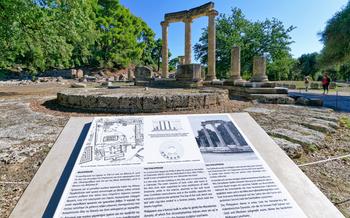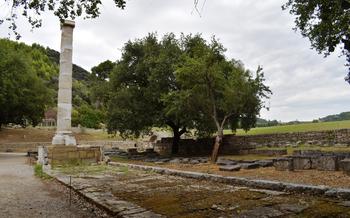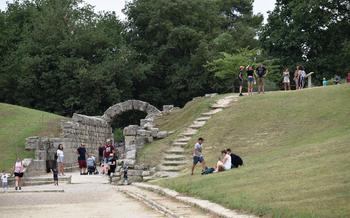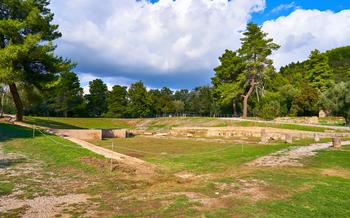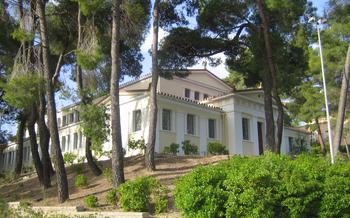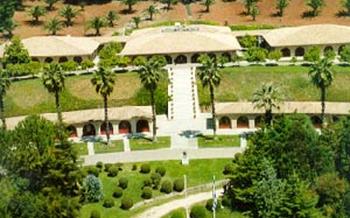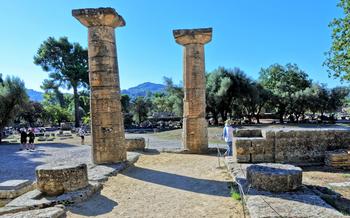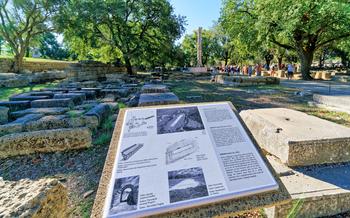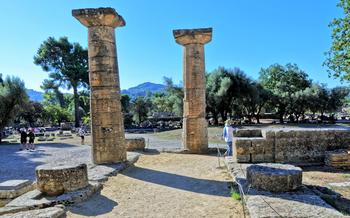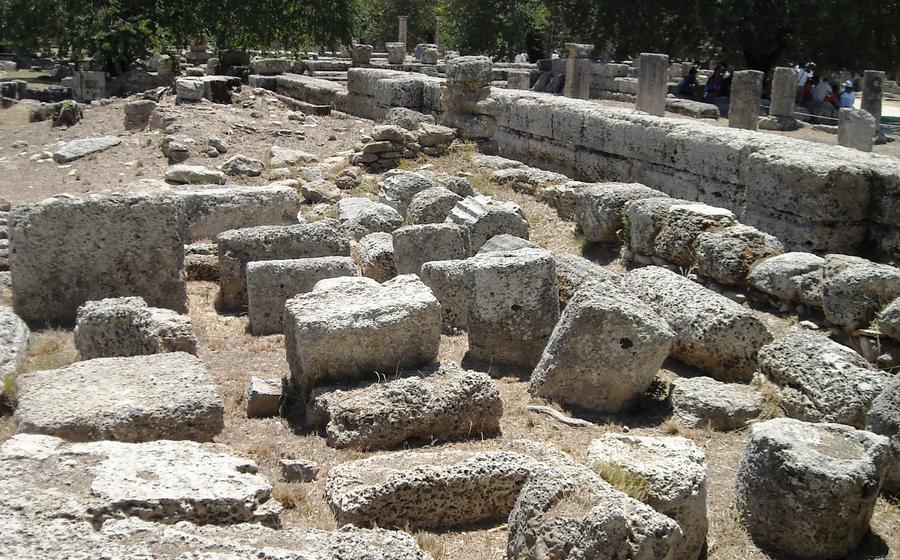
Museum of Ancient Greek Musical Instruments
- The Birthplace of the Olympics
- Museum of Ancient Greek Musical Instruments
- Guided Tours and Workshops: Unveiling the Melodies of Antiquity
- Interactive Exhibits and Displays
- Personal Anecdote
- Temporary Exhibitions and Events
- Souvenirs and Museum Shop
- Nearby Attractions and Activities
- Tips for First-Time Visitors
- Photography and Social Media
- Research and Publications
- Volunteering and Internship Opportunities
- Insider Tip: Explore the Hidden Treasures of the Museum Library
The Birthplace of the Olympics
Olympia, nestled in the western Peloponnese peninsula of Greece, is a land steeped in history and sporting legacy. As the birthplace of the ancient Olympic Games, Olympia holds a profound significance in the world of athletics and cultural heritage. The archaeological site of Olympia, a designated UNESCO World Heritage Site, transports visitors back in time to the origins of the Olympic tradition.
At the heart of Olympia lies the Altis, a sacred precinct dedicated to the worship of Zeus, the king of the gods. Within this hallowed ground, the ancient Greeks constructed magnificent temples, altars, and sporting facilities, including the renowned Olympic Stadium. Here, athletes from across the Hellenic world gathered every four years to compete in a grand spectacle of physical prowess and sportsmanship.
Imagine standing in the ancient stadium, surrounded by the echoes of history. Picture the jubilant crowds cheering as runners, wrestlers, and chariot racers displayed their skills and determination. The aura of the Olympic spirit still lingers in the air, a testament to the enduring legacy of Olympia as the birthplace of one of humanity's most celebrated sporting traditions.
Museum of Ancient Greek Musical Instruments
Housed within the walls of the ancient city of Olympia, the Museum of Ancient Greek Musical Instruments stands as a testament to the rich musical heritage of ancient Greece. This unique museum houses an extraordinary collection of musical instruments excavated from archaeological sites across the country, offering visitors a glimpse into the vibrant soundscape of the ancient world.
Music played a pivotal role in ancient Greek culture, serving as an integral part of religious rituals, festivals, and everyday life. From the lively melodies of the lyre to the rhythmic beats of percussion instruments, music filled the air of ancient Greece, accompanying celebrations, ceremonies, and dramatic performances.
The museum's collection boasts a diverse array of instruments, each crafted with meticulous care and showcasing the ingenuity of ancient Greek instrument makers. Lyres, with their graceful curves and delicate strings, are a prominent feature of the collection, representing the most common instrument of ancient Greece. Harps, with their resonant tones, and flutes, capable of producing haunting melodies, further enrich the museum's offerings. Percussion instruments, such as cymbals and drums, add a rhythmic pulse to the collection, evoking the energy of ancient Greek festivities.
A visit to the Museum of Ancient Greek Musical Instruments is not merely an exploration of ancient artifacts; it is a journey through time, allowing visitors to hear the echoes of a bygone era. Live performances using reconstructed instruments bring the instruments to life, transporting visitors to a world where music and history intertwine. The museum's collection and its dedication to preserving and sharing the musical heritage of ancient Greece make it a must-visit destination for anyone interested in the history of music, archaeology, or the enduring legacy of ancient Greek culture.
Guided Tours and Workshops: Unveiling the Melodies of Antiquity
Enhance your visit to the Museum of Ancient Greek Musical Instruments by joining a guided tour, led by knowledgeable experts who will provide fascinating insights into the history and significance of the instruments. These tours offer a deeper understanding of the role music played in ancient Greek culture, exploring the instruments' connection to religious rituals, festivals, and everyday life.
The museum also offers hands-on workshops, providing a unique opportunity to try playing some of the reconstructed instruments yourself. Under the guidance of experienced instructors, you'll learn the techniques and melodies of ancient Greek music, gaining a firsthand appreciation for the skill and artistry of these ancient musicians.
Practical Information:
-
Guided tours are available daily at specific times. Check the museum's website or inquire at the information desk for the schedule.
-
Fees for guided tours and workshops vary depending on the program and group size. Consult the museum's website or contact them directly for current pricing.
-
Advance booking is recommended for both guided tours and workshops to secure your spot, especially during peak tourist season.
Anecdote:
During my visit to the museum, I had the privilege of participating in a workshop on ancient Greek percussion instruments. I was initially hesitant, having no musical background, but the instructor's enthusiasm and guidance quickly put me at ease. As I struck the rhythm on a reconstructed tambourine, I felt a connection to the ancient musicians who used these instruments centuries ago. It was a truly immersive experience that brought the history of Greek music to life.
Interactive Exhibits and Displays
The Museum of Ancient Greek Musical Instruments offers a range of interactive exhibits and displays that allow visitors to engage with ancient Greek music in a hands-on way. These exhibits provide a unique opportunity to experience the sounds and rhythms of ancient Greece and gain a deeper understanding of the role of music in this ancient civilization.
One of the highlights of the museum's interactive exhibits is the audio stations, where visitors can listen to recordings of ancient Greek music performed on reconstructed instruments. These recordings bring the ancient instruments to life and allow visitors to appreciate the diverse range of sounds and styles that existed in ancient Greece.
The museum also features multimedia presentations and videos that provide additional information about the instruments and their cultural context. These presentations explore the history of ancient Greek music, its use in religious ceremonies, festivals, and everyday life, and the ways in which it influenced the development of Western music.
Another popular interactive exhibit is the "Play an Instrument" station, where visitors can try their hand at playing some of the reconstructed instruments. This is a great opportunity to experience the challenges and rewards of playing an ancient instrument and to gain a deeper appreciation for the skill and dedication of the ancient Greek musicians.
Through these interactive exhibits and displays, the Museum of Ancient Greek Musical Instruments offers visitors a unique and engaging way to explore the world of ancient Greek music. These exhibits provide a hands-on experience that allows visitors to connect with the past and gain a deeper understanding of the role of music in ancient Greek culture.
Personal Anecdote
During my visit to the museum, I spent a considerable amount of time exploring the interactive exhibits. I was particularly fascinated by the audio stations, where I could listen to recordings of ancient Greek music performed on reconstructed instruments. The sounds were hauntingly beautiful and transported me back in time to the ancient world.
I also tried my hand at playing the lyre, one of the most popular instruments in ancient Greece. It was surprisingly difficult to play, and I quickly realized the skill and practice required to master this ancient instrument.
The interactive exhibits at the Museum of Ancient Greek Musical Instruments provided me with a unique and engaging way to learn about ancient Greek music. I highly recommend exploring these exhibits to anyone interested in gaining a deeper understanding of this fascinating aspect of ancient Greek culture.
Temporary Exhibitions and Events
The Museum of Ancient Greek Musical Instruments hosts a variety of temporary exhibitions and special events throughout the year, offering visitors the chance to delve deeper into the world of ancient Greek music. These exhibitions may showcase rare or seldom-seen instruments, explore specific themes or periods of musical history, or feature collaborations with other institutions. Past exhibitions have covered topics such as the music of the ancient Greek theater, the musical traditions of different regions of Greece, and the influence of ancient Greek music on Western classical music. Special events include concerts, lectures, workshops, and family-friendly activities, providing visitors with opportunities to experience ancient Greek music in a live setting and learn more about its cultural significance.
To find out about upcoming exhibitions and events, visitors can check the museum's website or social media pages. The museum also offers a newsletter that provides regular updates on upcoming events and activities. Attending a temporary exhibition or special event at the Museum of Ancient Greek Musical Instruments is an excellent way to gain a deeper understanding of the rich musical heritage of ancient Greece and experience the instruments and music in a unique and engaging way.
Personal Anecdote:
During my visit to the museum, I had the privilege of attending a special concert featuring a performance of ancient Greek music on reconstructed instruments. The concert was held in the museum's auditorium, which provided an intimate and immersive setting for the performance. The musicians used a variety of instruments, including lyres, harps, flutes, and percussion instruments, to recreate the sounds of ancient Greek music. The performance was captivating, transporting me back in time to the ancient world and allowing me to experience the music in a way that was both authentic and deeply moving.
Souvenirs and Museum Shop
The Museum of Ancient Greek Musical Instruments boasts a well-stocked museum shop where visitors can purchase a variety of souvenirs to remember their visit. From intricately crafted replicas of ancient instruments to books delving into the history and significance of Greek music, the shop offers a diverse selection of items to suit every taste and budget.
Unique items inspired by ancient Greek musical instruments are also available, such as jewelry featuring lyre motifs and CDs featuring reconstructed performances of ancient Greek music. These souvenirs make for thoughtful gifts or personal keepsakes, serving as tangible reminders of the museum's fascinating collection.
The museum shop is conveniently located within the museum premises, making it easy for visitors to browse and purchase items before or after their exploration of the exhibits. The shop accepts various payment options, including cash, credit cards, and contactless payments, ensuring a seamless shopping experience.
Anecdote:
During my visit to the museum, I stumbled upon a beautifully crafted replica of a lyre in the museum shop. Intrigued, I decided to purchase it as a memento of my experience. The lyre, adorned with intricate carvings, serves as a constant reminder of the rich musical heritage of ancient Greece and the captivating exhibits I encountered at the museum.
Nearby Attractions and Activities
The Museum of Ancient Greek Musical Instruments is situated in the heart of Olympia, a region steeped in history and natural beauty. Beyond the museum's walls, visitors can embark on a journey of discovery, exploring nearby attractions that complement and enhance their experience.
A short walk from the museum lies the Archaeological Museum of Olympia, showcasing a treasure trove of artifacts from the ancient Olympic Games. Here, visitors can marvel at the iconic statue of Hermes by Praxiteles, bronze sculptures of athletes, and intricate carvings that narrate the stories of Olympic victors.
Nature enthusiasts can find solace in the tranquil Ancient Olympia Archaeological Park, where the ruins of the ancient Olympic stadium, gymnasium, and other sports facilities stand amidst lush greenery. The park offers a serene setting for a leisurely stroll or a picnic, allowing visitors to imagine the grandeur of the ancient games while immersing themselves in the beauty of the natural surroundings.
For those seeking a taste of local culture, the Olympia Farmers Market is a vibrant hub of activity, where vendors display an array of fresh produce, traditional delicacies, and handcrafted souvenirs. Visitors can savor the flavors of the region, engage with the friendly locals, and take home a piece of Olympia's culinary heritage.
A drive along the scenic Alfeios River leads to the picturesque Neda Waterfalls, a series of cascading waterfalls surrounded by lush vegetation. Visitors can take a refreshing dip in the crystal-clear waters, admire the stunning views, and capture breathtaking photographs of nature's artistry.
Olympia's proximity to the Ionian Sea offers opportunities for beachside relaxation and water sports. The nearby beaches of Katakolo and Kourouta boast golden sands, crystal-clear waters, and a variety of water sports facilities, providing a welcome respite from cultural exploration.
Tips for First-Time Visitors
As a seasoned traveler and museum enthusiast, I've accumulated a wealth of knowledge and experience that I'm eager to share with first-time visitors to the Museum of Ancient Greek Musical Instruments. Allow me to offer some invaluable tips to ensure you make the most of your visit:
-
Plan Your Visit Wisely: To avoid the throngs of tourists and have a more intimate experience, plan your visit outside of peak season or during weekdays. The museum is typically less crowded in the mornings, so aim to arrive early to have ample time to explore at your own pace.
-
Prioritize Your Interests: The museum houses a vast collection of instruments, so it's essential to prioritize your interests. If you're particularly drawn to lyres, for instance, focus your attention on that section. This will help you make the most of your time and avoid feeling overwhelmed.
-
Engage with the Interactive Exhibits: Don't just passively observe the instruments; take advantage of the museum's interactive exhibits. Listen to recordings of ancient Greek music, try your hand at playing a reconstructed instrument, or immerse yourself in the multimedia presentations. These interactive elements will deepen your understanding and appreciation of ancient Greek music.
-
Join a Guided Tour: Consider joining a guided tour to gain deeper insights into the history and significance of the instruments. Knowledgeable guides will provide context and anecdotes that will bring the exhibits to life. Be sure to book your spot in advance to avoid disappointment.
Photography and Social Media
The Museum of Ancient Greek Musical Instruments encourages visitors to capture their experiences through photography and share them on social media. Designated areas within the museum allow photography, but the use of flash or tripods is prohibited to protect the delicate artifacts. Visitors are welcome to share their photos and videos online using relevant hashtags and tagging the museum's official accounts. By doing so, they contribute to the museum's mission of promoting ancient Greek music and culture to a wider audience.
One of my most memorable experiences at the museum was capturing the intricate details of a beautifully preserved lyre. The soft lighting and the instrument's elegant curves created a captivating image that I couldn't resist sharing. As I posted the photo on Instagram, I included a caption expressing my awe at the craftsmanship and artistry of the ancient Greek instrument makers. To my delight, the post received numerous likes and comments from fellow music enthusiasts and history buffs.
Sharing my experiences at the Museum of Ancient Greek Musical Instruments on social media not only allowed me to connect with like-minded individuals but also contributed to the museum's efforts to raise awareness and appreciation for this unique cultural heritage. It was a rewarding way to document my visit and inspire others to explore the wonders of ancient Greek music.
Research and Publications
The Museum of Ancient Greek Musical Instruments is not solely dedicated to showcasing its collection; it plays an active role in advancing the field of musicology and archaeology through ongoing research projects and publications. The museum's research team, comprised of experts in ancient music and archaeology, delves into various aspects of ancient Greek music and musical instruments. Their findings are meticulously documented and disseminated through scholarly publications, contributing to the broader understanding of this significant cultural domain.
These publications take diverse forms, including academic papers, monographs, and comprehensive catalogs of the museum's collection. They cover a wide range of topics, from the technical analysis of ancient instruments to the examination of music's role in ancient Greek society. Through these publications, the museum shares its expertise with the global scholarly community, fostering collaboration and stimulating further research.
Personally, I had the opportunity to utilize the museum's publications for a research project on the evolution of the ancient Greek lyre. The detailed descriptions and analysis provided in the museum's catalog proved invaluable, offering insights that enriched my understanding of this iconic instrument. The museum's commitment to research ensures that its collection remains not only a treasure trove of ancient artifacts but also a catalyst for new knowledge and understanding.
Volunteering and Internship Opportunities
The Museum of Ancient Greek Musical Instruments welcomes volunteers and interns who are passionate about ancient Greek music and culture. Volunteers play a vital role in assisting with various tasks, such as leading guided tours, conducting workshops, and providing administrative support. Interns are given the opportunity to work on specific projects under the guidance of museum professionals, gaining hands-on experience in the fields of museology, archaeology, and music.
To become a volunteer or intern, individuals must submit an application form and go through a selection process. The museum offers flexible schedules to accommodate volunteers and interns from different backgrounds and commitments. Volunteering and internship positions are a rewarding way to contribute to the preservation and promotion of ancient Greek musical heritage while gaining valuable experience in a unique and dynamic environment.
Anecdote:
During my time as a volunteer at the museum, I had the privilege of working closely with the curators and learning about the fascinating history of ancient Greek musical instruments. I assisted in organizing educational workshops for children, where they got to make their own replicas of ancient instruments and learn how to play them. It was incredibly fulfilling to see the children's enthusiasm and curiosity as they discovered the world of ancient Greek music. Volunteering at the museum not only enriched my knowledge but also gave me the opportunity to share my passion for music with others.
Insider Tip: Explore the Hidden Treasures of the Museum Library
Beyond the main exhibition halls, the Museum of Ancient Greek Musical Instruments houses a hidden treasure—its extensive library. This treasure trove of knowledge contains rare books, manuscripts, and research materials related to ancient Greek music and musical instruments. Visitors who are passionate about delving deeper into the subject can request access to the library and spend hours exploring its rich collection. The knowledgeable staff is always ready to assist visitors in finding the resources they need. Whether you're a researcher, a student, or simply a curious enthusiast, the museum's library offers a unique opportunity to immerse yourself in the fascinating world of ancient Greek music.
